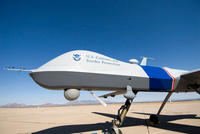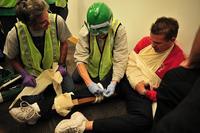-
Texas to appeal FEMA decision not to declare West, Texas a disaster area
The Federal Emergency Management Agency (FEMA) said President Obama would not declare West, Texas a disaster area in the wake of the massive fertilizer plant explosion there two months ago, and Texas governor Rick Perry is not happy. FEMA said Texas did not make the case the state lacked funds for cleanup and recovery efforts.
-
-
New Jersey faces costly water infrastructure upgrades

Before Hurricane Sandy hit New Jersey, state officials knew they had much work ahead of them to update the state’s water infrastructure. The damage Sandy inflicted only highlighted the inadequacies of New Jersey’s outdated wastewater, stormwater, and drinking water infrastructure. Upgrading the system will be costly, but not doing so will be costlier.
-
-
U.S. confirms: Assad used chemical weapons against Syrian rebels, civilians (updated)

The Obama administration has informed Congress a few minutes ago that the U.S. intelligence community has determined that the Assad regime has used chemical weapons on several occasions against both rebel forces and Syrian civilians. The U.S. intelligence community says these attacks, each using small quantities of sarin gas, have killed about 150 Syrians. The president’s deputy national security adviser, Ben Rhodes, told reporters that the president had decided to provide “direct military support” to the opposition. Rhodes said the U.S. military assistance to the rebels would be different in “both scope and scale” from what had been authorized before, which included non-lethal equipment such as night-vision goggles and body armor.
-
-
Justice Department endorses NYPD’s stop-and-frisk

The Justice Department (DOJ) has entered the debate on the New York Police Department’s stop-and-frisk policy, telling a federal judge that DOJ endorses the program as long as there is independent oversight to monitor changes in the policy if civil rights violations occur.
-
-
Environmental group sues State Department for Keystone XL-related files
The Sierra Club has announced it is suing the State Department for files related to an environmental review draft of the Keystone XL pipeline. The group tried to gain access to the files through the Freedom of Information Act, but the request was denied, so the group filed the suit on Monday in the U.S. District Court in the Northern District of California.
-
-
U.S. confirms: Assad used chemical weapons against Syrian rebels, civilians
The Obama administration has informed Congress a few minutes ago that the U.S. intelligence community has determined that the Assad regime has used chemical weapons on several occasions against both rebel forces and Syrian civilians. The U.S. intelligence community says these attacks, each using small quantities of sarin gas, have killed about 150 Syrians.
-
-
NSA director: surveillance programs prevented “dozens” of terror attacks
Gen. Keith Alexander, the director of the National Security Agency (NSA) and commander of the U.S. Cyber Command, told lawmakers yesterday (Wednesday) that the NSA’s electronic surveillance programs have been indispensable in thwarting “dozens” of terrorist attacks on targets in the United States and abroad. He told the senators that securing a “cyber arena” could be done without infringing upon the privacy rights of Americans. “We do not see a tradeoff between security and liberty,” Alexander said, later adding, “We are trying to protect Americans.”
-
-
Al Qaeda-affiliated militants training in using shoulder-fired anti-aircraft missile

A Xerox copy of a 26-page manual with instructions on how to use man-portable air-defense systems, or MANPADS – also called SA-7 — was found in a building in Timbuktu in North Mali which was used by Al Qaeda in the Islamic Maghreb operatives during the 8-month control – April 2012 to February 2013 — of the area by Islamist militants. The Libyan military under Col. Qaddafi had about 15,000 SA-7s, but after the Qaddafi regime fell in November 2011, NATO forces and Libyan militias loyal to the government gained possession of only 5,000 of them. The rest have disappeared into the arsenals of different militias, and have probably found their way to different terrorist organizations in North Africa and the Middle East.
-
-
Defense companies turn their attention to border security

The U.S. involvement in the Iraq war is over, and the country will soon withdraw its troops from Afghanistan. Federal budgets cuts shrink agencies’ ability to conduct research and development. Faced with these realities, military contractors have begun to focus on border security. What many defense companies find especially appealing is the fact that the Senate immigration bill conditions any move toward legalizing the status of more than eleven million illegal immigrants in the United States on the strengthening of security along the U.S.-Mexico border.
-
-
U.S. cities preparing for disasters

In the last year the United States, among other challenges, faced Hurricane Sandy, the Sandy Hook shooting, the Boston Marathon bombings, and Tornadoes in Oklahoma. The future is unpredictable, so cites across the United States are taking steps to be in a better position to respond to disasters.
-
-
Fast, reliable identification of pathogens
Life-threatening bacterial infections cause tens of thousands of deaths every year in North America, but current methods of culturing bacteria in the lab can take days to report the specific source of the infection, and even longer to pinpoint the right antibiotic that will clear the infection. Researchers have created an electronic chip that can analyze blood and other clinical samples for infectious bacteria with record-breaking speed.
-
-
House panel to unveil cybersecurity bill
Republicans on the House Homeland Security Committee are close to finalizing a long-awaited cybersecurity bill, following extensive discussions with private companies.The bill formally establishes DHS’s already-operating National Cybersecurity and Communications Integration Center, to circulate cyberthreat and vulnerability data.
-
-
ACLU files lawsuit challenging NSA's phone surveillance
In the wake of the past week’s revelations about the NSA’s surveillance of phone calls, the yesterday American Civil Liberties Union (ACLU) filed a lawsuit charging that the program violates Americans’ constitutional rights of free speech, association, and privacy.
-
-
Cloud computing user privacy needs serious reform: scholars
When Web surfers sign up for a new online service or download a Web application for their smartphone or tablet, the service typically requires them to click a seemingly innocuous box and accept the company’s terms of service and privacy policy. Agreeing to terms without reading them beforehand, however, can adversely affect a user’s legal rights, says a new paper by an expert in technology and legal issues.
-
-
NIST publishes draft cloud computing security document for comment
The National Institute of Standards and Technology (NIST) has published a draft document on security for cloud computing as used in the federal government. The public comment period runs through 12 July 2013.
-
More headlines
The long view
Preventing Another 'Jan. 6' Starts by Changing How Elections Are Certified, Experts Say
The 2024 presidential election may be a rematch between President Joe Biden and former President Donald Trump, but preventing a repeat of Jan. 6, 2021 — when false claims of a stolen election promoted by Donald Trump and his allies led to an insurrection at the U.S. Capitol —will be top of mind this election year. Research finds broad support among public for nonpartisan certification commissions.
States Rush to Combat AI Threat to Elections
This year’s presidential election will be the first since generative AI became widely available. That’s raising fears that millions of voters could be deceived by a barrage of political deepfakes. Congress has done little to address the issue, but states are moving aggressively to respond — though questions remain about how effective any new measures to combat AI-created disinformation will be.
Chinese Government Hackers Targeted Critics of China, U.S. Businesses and Politicians
An indictment was unsealed Monday charging seven nationals of the People’s Republic of China (PRC) with conspiracy to commit computer intrusions and conspiracy to commit wire fraud for their involvement in a PRC-based hacking group that spent approximately 14 years targeting U.S. and foreign critics, businesses, and political officials in furtherance of the PRC’s economic espionage and foreign intelligence objectives.
European Arms Imports Nearly Double, U.S. and French Exports Rise, and Russian Exports Fall Sharply
States in Europe almost doubled their imports of major arms (+94 per cent) between 2014–18 and 2019–23. The United States increased its arms exports by 17 per cent between 2014–18 and 2019–23, while Russia’s arms exports halved. Russia was for the first time the third largest arms exporter, falling just behind France.
LNG Exports Have Had No Impact on Domestic Energy Costs: Analysis
U.S. liquified natural gas (LNG) exports have not had any sustained and significant direct impact on U.S. natural gas prices and have, in fact, spurred production and productivity gains, which contribute to downward pressure on domestic prices.
